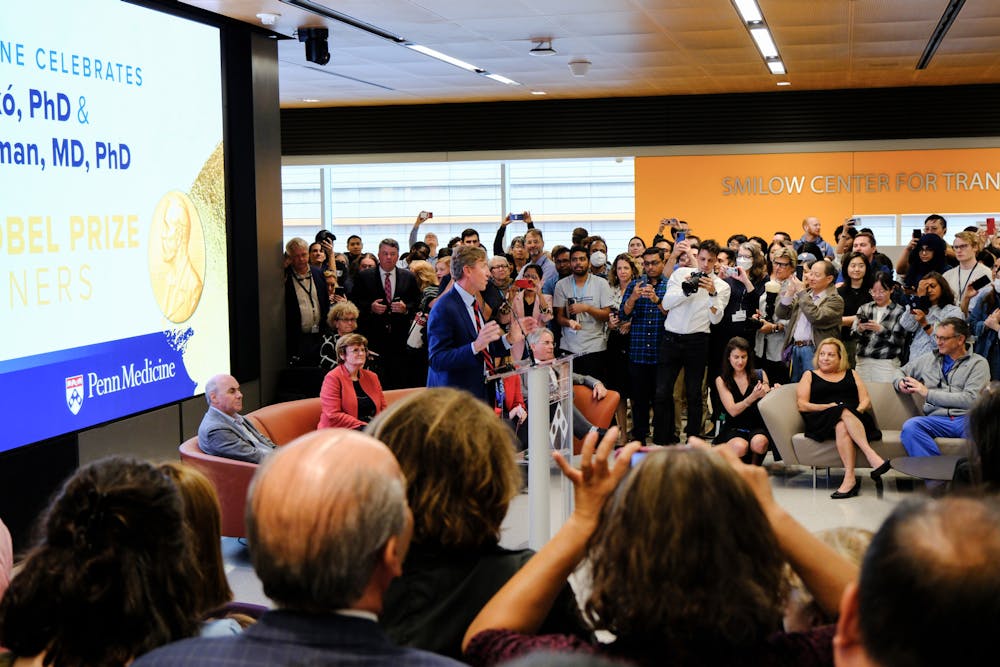Penn Medicine researchers Katalin Karikó and Drew Weissman were celebrated with a flash mob after winning the Nobel Prize in Physiology or Medicine for their mRNA vaccine research.
Hundreds of students, faculty, and staff gathered for the event at the Smilow Commons Lobby in the Perelman School of Medicine. President Liz Magill, Dean of the Perelman School of Medicine J. Larry Jameson, Chief Executive Officer of the University of Pennsylvania Health System Kevin B. Mahoney, and Executive Vice Dean and Chief Scientific Officer Jon Epstein also attended.
Magill started off the event with a toast to the research team.
“Drew and Kate’s curiosity, their inventiveness, their tenacity and their devotion to the collective good … Our greatest achievements come from tenacious efforts that occur every day, day after day," Magill said.
Students and faculty from the University and medical community crowded to get a glimpse of the Nobel Prize-winning duo and take photos with them.
“I am absolutely thrilled; this is so well deserved," Perelman School of Medicine professor Sarah Tishkoff said. "Every one of us who had an mRNA vaccine, we have them to thank. They kept my mother — my 90-year-old mother — alive."
Third year Ph.D. student in the Biochemistry & Biophysics Department Hemma Murali was especially excited for Karikó, citing how she overcame the barriers present for women in STEM to promote her discovery.
“I think it’s really cool that there’s a woman winning a Nobel Prize after so long,” Murali said. “As I lead the Penn Graduate Women in Science and Engineering Group, this is something we think about and discuss a lot.”
RELATED:
Penn Medicine develops mRNA vaccine against Lyme disease
Carl June wins Breakthrough Prize in Life Sciences for development of CAR-T cell immunotherapy
Tishkoff added that she was proud of Karikó's persistence despite challenges. In the 1990s, Karikó was on the path to professorship at Penn, but she was demoted after the University saw her work as too financially risky to fund. She stayed at Penn until 2013 but was never reinstated to her position even after the University patented the technology from Karikó and Weissman’s 2005 research.
“The fact that Katalin persisted, kept going, and got a Nobel Prize after she couldn’t get tenure and couldn’t get a grant is amazing," Tishkoff said. "She’s an inspiration for all women — women scientists in particular.”
Senior Executive Director of Development for the Abramson Cancer Center Kathleen Hertcorn attended the event on behalf of the colleagues in her office who raised research funds for the mRNA research that occurred at Penn.
“It’s an incredible moment to know that we are all part of this process and really making an impact on humanity," Hertcorn said, "and to know that this is happening right here in our own backyard of Philadelphia and how we’ve had an impact on the world."
Some students said they were excited to get up close to the research team who made the discoveries that they are currently learning about in class.
First year Genetic Counseling student Lily Elman told The Daily Pennsylvanian that students were learning about mRNA in the Genetic Counseling program’s advanced genetics class.
"Seeing that it started at Penn is really exciting," Elman said.
Elman’s classmate, Perelman School of Medicine student Lauren Lairson, echoed a similar sentiment.
"It feels good to know that you are going to a university that is making great strides in the medical community and that’s making a difference," Lairson said.
Karikó, professor of Neurosurgery at the Perelman School of Medicine, and Weissman, the Roberts Family Professor of Vaccine Research at the Perelman School of Medicine, won the award for their past research into messenger RNA technology on Oct. 2. Their research — primarily a groundbreaking 2005 study — was critical in the development of Pfizer/BioNTech and Moderna’s COVID-19 vaccines.









